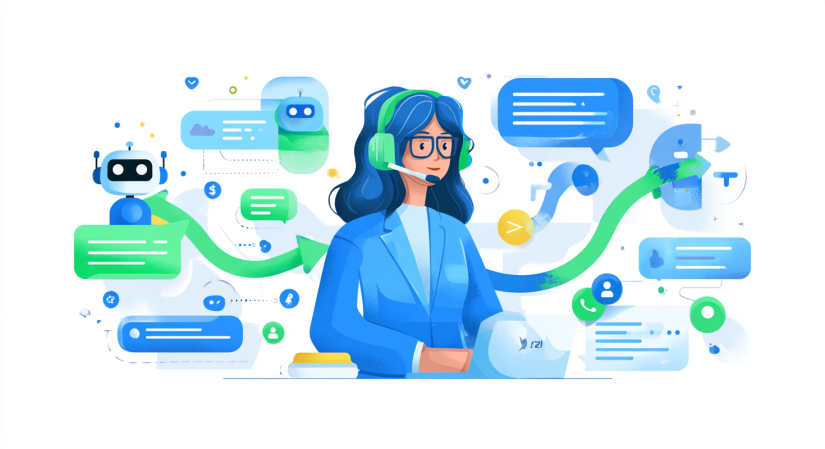Generative AI is transforming the landscape of customer service, particularly within contact centers. As businesses increasingly turn to ChatGPT agents to enhance efficiency and customer engagement, understanding the interplay between this advanced technology and security is crucial.
This post delves into the essence of generative AI in contact centers, explores the paramount security concerns it raises, and outlines strategies to mitigate these risks, ensuring a secure and effective deployment of ChatGPT agents.
Discover how Convin can address your generative AI security concerns.
What is Generative AI in Contact Centers?
Generative AI, particularly in the form of ChatGPT agents, represents a groundbreaking shift in how contact centers operate. These AI-driven agents use sophisticated machine learning models to understand, generate, and respond to customer queries with a level of nuance and context sensitivity previously unattainable by traditional automated systems.
In contact centers, generative AI like ChatGPT can handle a range of tasks, from addressing common customer inquiries to providing more complex support. This enhances efficiency and frees human agents to tackle more intricate issues. This integration of ChatGPT in customer service and call centers streamlines operations and significantly improves the customer experience.
What are the Top Concerns About Generative AI and Security in Contact Centers?
1. Data Privacy and Confidentiality
a. Generative AI's Hunger for Data: ChatGPT agents and similar AI tools thrive on data. They need vast datasets to learn and refine their ability to interact in human-like, contextually relevant ways. This dependency on data poses a significant risk, particularly when dealing with sensitive information in contact centers. The concern escalates when these AI systems process, store, or learn from personal and confidential customer data.
b. Example: If a ChatGPT agent is not adequately secured, hackers could potentially extract personal customer data from its training database or intercept this data during live interactions. To counteract this, encryption and stringent data access controls are vital, alongside ensuring that the AI system only retains the necessary data and disposes of it correctly after use.
c. Mitigation Strategies: Ensuring data privacy and confidentiality requires stringent data handling and processing protocols. Encryption, anonymization, and secure data storage should be the norm, not the exception. Furthermore, deploying ChatGPT agents should come with assurances that the AI's training data is sourced ethically and does not compromise customer privacy.
2. AI Misuse
a. The Dual-Edged Sword: The flexibility and adaptability that make ChatGPT agents so valuable in customer service also make them susceptible to misuse. Whether through external hacking attempts or internal vulnerabilities, there's a real risk of these AI systems being co-opted to engage in fraudulent activities or data theft.
b. Example: Consider a ChatGPT agent in a contact center being fed misleading information intentionally during its learning phase, causing it to adopt biased or inappropriate responses. There's also the risk of AI being used to impersonate individuals, commit fraud, or extract sensitive information from unsuspecting customers.
c. Guarding Against Misuse: Robust security measures are essential to shield ChatGPT agents from misuse. This includes regular security audits, implementing intrusion detection systems, and establishing strict access controls. Additionally, regular monitoring of AI interactions can help identify and rectify any deviations from expected behavior, ensuring that ChatGPT agents remain reliable allies in customer service.
3. Dependence and Reliability
a. The Risk of Over-Reliance: Integrating ChatGPT in call centers and customer service workflows can lead to over-reliance on these AI systems. Such dependence could become a critical vulnerability if the AI systems fail or generate inaccurate responses, potentially leading to customer dissatisfaction or worse.
b. Example: If a ChatGPT agent in a call center provides incorrect financial advice to customers due to a glitch or training oversight, it could lead to significant financial loss for the customers and damage the organization's reputation. Regular monitoring, testing, and human oversight are essential to ensure the AI's reliability and accuracy.
c. Ensuring AI Reliability: To counteract this, it's vital to maintain a balanced symbiosis between AI agents and human operators. Ensuring that ChatGPT agents have fallback mechanisms and that human supervisors can intervene when necessary can maintain reliability and trust in the system. Continuous training and updates are also crucial to keep the AI systems in tune with the latest information and protocols.
4. Compliance and Regulation

a. Navigating the Regulatory Landscape: The deployment of ChatGPT agents in contact centers isn't just a technological or operational challenge—it's also a legal one. With varying regulations governing data protection, privacy, and AI ethics, ensuring that ChatGPT agents comply with all applicable laws is a significant concern.
b. Example: A ChatGPT agent used in a healthcare contact center must comply with HIPAA regulations, ensuring patient information's confidentiality and security. Any breach or non-compliance could result in substantial penalties and loss of trust among users.
c. Achieving Compliance: To address this, contact centers must stay abreast of relevant regulations and ensure that their use of ChatGPT prompts and other AI technologies aligns with these standards. This might involve regular compliance audits, adherence to industry best practices, and possibly even engaging with legal experts to navigate the complex regulatory environment.
While ChatGPT agents offer transformative potential for contact centers, navigating the associated security challenges requires a proactive, informed approach. By understanding and addressing these concerns, contact centers can leverage the power of ChatGPT to enhance customer service while maintaining the highest standards of security, reliability, and compliance.
This blog is just the start.
Unlock the power of Convin’s AI with a live demo.

Mitigating Concerns About Generative AI and Security in Contact Centers!
Integrating ChatGPT agents into contact centers marks a transformative shift in customer service, offering enhanced efficiency and a new level of interaction. However, to fully leverage the benefits of ChatGPT in customer service and ensure a secure environment, here's an in-depth exploration of the strategies to mitigate potential security concerns.
1. Implement Robust Data Protection Measures
a. Encryption and Access Controls: Advanced encryption secures data before it reaches ChatGPT, and strict access controls limit system interaction. Together, these safeguards minimize the risk of a ChatGPT data breach by keeping sensitive information encrypted and inaccessible.
b. Data Anonymization: When ChatGPT agents process customer data, it's crucial to anonymize Sensitive information. This means that even if data is accessed improperly, the confidentiality of customer information is not compromised.
c. Regular Audits and Compliance Checks: Conducting routine audits ensures that the data protection measures in place are effective and compliant with current standards. For instance, a ChatGPT call center handling sensitive financial information must adhere to industry-specific regulations like PCI DSS to protect customer data.
2. Monitor and Control AI Operations
a. Continuous Monitoring: Implementing real-time monitoring systems can detect unusual patterns or potential misuse of ChatGPT agents. For example, if a ChatGPT agent starts requesting sensitive information from customers without a clear need, it should trigger an alert for further investigation.
b. Setting Clear Boundaries: Establishing operational boundaries for ChatGPT agents ensures they operate within predefined limits. For instance, agents should be programmed not to engage in transactions or share sensitive data without proper authentication protocols.
3. Ensure Transparency and Explainability
a. Transparent Operations: The decision-making processes of ChatGPT agents should be transparent, allowing human agents to understand the rationale behind given responses. This clarity helps in building trust with the technology and facilitates easier intervention when necessary.
b. Explainability: If a ChatGPT agent in a contact center provides an incorrect response or takes an unexpected action, staff should be able to trace back and understand the reasoning behind it. This is crucial for accountability and continuous improvement of AI systems.
4. Provide Continuous Training and Support
a. Updating AI Models: Regularly updating ChatGPT models with new data and insights ensures they remain effective and relevant. For example, the AI should learn from new interactions as customer service scenarios evolve to provide more accurate responses.
b. Training Human Staff: Equipping staff with the knowledge to work alongside ChatGPT agents ensures harmonious and efficient collaboration. This includes understanding how to intervene when AI responses are insufficient or incorrect and how to provide feedback for AI improvement.
5. Establish Clear Compliance and Ethical Guidelines
a. Compliance Policies: Given the diverse applications of ChatGPT in call centers, it's vital to have specific guidelines that align with legal standards and industry best practices. For instance, a ChatGPT contact center must comply with GDPR if it serves European customers.
b. Ethical Guidelines: Establishing ethical guidelines ensures that AI is used responsibly. This includes ensuring that ChatGPT agents do not manipulate or mislead customers and that they provide accurate and unbiased information.
By implementing these detailed strategies, contact centers can mitigate the security concerns associated with generative AI, ensuring that ChatGPT agents deliver their intended benefits without compromising security or customer trust.
Fortifying Contact Center Security with Convin's Generative AI Solutions!
Convin's suite of products, powered by generative AI, offers robust solutions to ensure the security and safety of contact center operations.
Here's how Convin enhances the security framework of contact centers, fostering a trustworthy environment for both customers and agents.
1. Enhanced Data Privacy and Protection
- Feature: Convin employs advanced encryption and data anonymization techniques to secure customer data processed by generative AI, including ChatGPT agents.
- Impact: This ensures that sensitive information remains confidential, mitigating risks of data breaches or unauthorized access. For instance, when ChatGPT agents handle personal customer information, these security measures ensure that the data is not compromised.
2. Real-Time Monitoring with Agent Assist

- Feature: Convin's Agent Assist tool offers real-time monitoring of interactions, providing live guidance to ChatGPT agents to adhere to security protocols.
- Impact: If a ChatGPT agent in a customer service scenario is about to make a security misstep, Agent Assist can instantly intervene, offering corrective advice or blocking the action, thus preventing potential security incidents.
3. Automated Compliance and Quality Control

- Feature: Convin's automated quality management system continuously reviews interactions to ensure compliance with industry regulations and internal security policies.
- Impact: This system can quickly identify and rectify any non-compliant actions or security lapses, ensuring that ChatGPT agents in call centers operate within the required legal and ethical frameworks.
4. Tailored Training and Development
- Feature: Convin offers comprehensive training programs designed to enhance the understanding of generative AI among contact center staff, focusing on security best practices.
- Impact: Educated employees can better leverage ChatGPT in contact centers, maximizing their potential while ensuring secure operations. This proactive education helps recognize and address security vulnerabilities promptly.
5. Continuous Improvement Through Analytics
- Feature: Convin's analytics provide insights into the performance and security of ChatGPT agents, identifying trends and areas for improvement.
- Impact: By understanding how ChatGPT agents interact with customers and where security gaps may exist, contact centers can make informed adjustments, continually enhancing the security and effectiveness of their operations.
Through these strategic approaches, Convin empowers contact centers to embrace generative AI, like ChatGPT agents, ensuring that advancements in customer service are matched with stringent security measures, thereby establishing a secure, reliable, and future-proof customer support system.
Unlock the solution to generative AI security concerns; schedule your demo with Convin today and safeguard your contact center's future!
FAQs
1. What are some of the common challenges generative AI is facing?
Generative AI struggles with ensuring accuracy and relevance in outputs and managing the vast data requirements for training without bias.
2. What are the risks of generative AI?
It can potentially propagate misinformation or biased content and may lead to loss of jobs in sectors heavily reliant on human interaction.
3. What are the security concerns of AI?
AI poses risks of data breaches, misuse of personal information, and vulnerability to cyberattacks due to its integral data processing functions.
4. How does AI affect contact centers?
AI transforms contact centers by automating responses and enhancing customer service efficiency but introduces challenges in integrating human and AI interactions seamlessly.
5. What is the challenge associated with implementing generative AI in customer experience?
Implementing generative AI in customer experience poses challenges in maintaining personalization and emotional intelligence comparable to human agents.
6. What are the constraints of generative AI?
Generative AI is limited by the quality and diversity of its training data and the ongoing challenge of understanding and generating human-like nuances in language and creativity.








.avif)